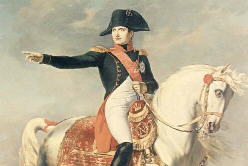


Napoleon was one of the greatest military commanders in history. He has also been portrayed as a power hungry conqueror. Napoleon denied being such a conqueror. He argued that, instead, he had attempted to build a federation of free peoples in a Europe united under a liberal government. But if this was his goal he intended to achieve it by concentrating power in his own hands. However, in the states he created, Napoleon granted constitutions, introduced law codes, abolished feudalism, created efficient governments and fostered education, science, literature and the arts.
Emperor Napoleon proved to be a superb civil administrator. One of his greatest achievements was his supervision of the revision and collection of French law into codes. The new law codes -- seven in number -- incorporated some of the freedoms gained by the people of France during the French revolution, including religious toleration and the abolition of serfdom. The most famous of the codes, the Code Napoleon or Code Civil, still forms the basis of French civil law. Napoleon also centralized France's government by appointing prefects to administer regions called departments, into which France was divided.
The widespread notion of Napoleon's shortness lies in the inaccurate translation of old French feet ("pieds de roi") to English. The French measure of five foot two (5' 2"), recorded at his autopsy, actually translates into five feet six and one half inches (5' 6.5") in English measure, which was about the average height of the Frenchman of his day. It's also probable that the grenadiers of his Imperial Guard, with whom he "hung out," were very tall men, therefor creating the illusion that Napoleon was very short.
For more about Napoleon click on one of the links below.